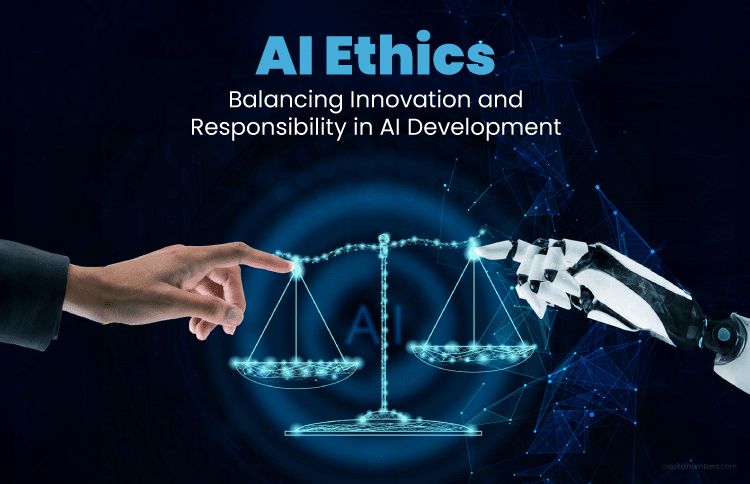AI Ethics: Balancing Innovation and Responsibility in AI Development
Table of Contents
Artificial Intelligence (AI) has moved from science fiction to an integral part of our daily lives in just a few short years. From recommendation systems that personalize our online shopping to advanced medical diagnostics that save lives, AI is transforming industries at a breathtaking pace. Businesses, governments, and individuals are embracing AI to solve complex problems and unlock new opportunities.
However, as AI systems grow more powerful, they also bring new challenges. Concerns about bias, privacy, transparency, and accountability are shaping global discussions. The real question is not whether we can innovate faster, but whether we can do so responsibly. This is where AI ethics comes in – ensuring that technology serves humanity without causing harm. Balancing innovation with responsibility is not only a moral imperative but also a strategic necessity for sustainable growth.
What is AI Ethics?
AI ethics refers to the set of principles and practices that guide the design, development, and deployment of artificial intelligence in a way that respects human rights and societal values. It addresses questions such as:
- How do we ensure AI makes fair and unbiased decisions?
- Who is accountable when AI systems make mistakes?
- How do we protect user privacy in a data-driven world?
The core pillars of AI ethics include:
- Fairness – Avoiding discriminatory outcomes.
- Transparency – Making AI decisions understandable to humans.
- Accountability – Defining responsibility for AI actions.
- Privacy – Protecting user data from misuse.
- Safety – Ensuring AI operates reliably without causing harm.
AI ethics is not just about compliance with laws; it’s about embedding trust, integrity, and human-centered thinking into every stage of AI development.
The Drive for Innovation
AI innovation is fueled by rapid advancements in computing power, data availability, and machine learning algorithms. Organizations across sectors are exploring AI to stay competitive and relevant.
- Healthcare – AI-powered imaging tools detect diseases earlier than human specialists.
- Finance – Predictive models help identify fraudulent transactions in real time.
- Retail – Personalized recommendation engines increase customer engagement.
- Transportation – Autonomous vehicles promise safer and more efficient travel.
The benefits are enormous: increased productivity, cost savings, better decision-making, and entirely new products and services.
However, this drive for innovation sometimes prioritizes speed over safety. For instance, a rushed AI deployment in hiring software may unintentionally favor certain candidates over others due to biased training data. Similarly, AI-generated content tools can be exploited to spread misinformation faster than it can be fact-checked.
True innovation should aim for long-term societal benefit, not just short-term gains.
You May Also Read: AI in 2025: Reshaping Healthcare, Finance, and Retail
Ethical Challenges in AI
While AI has incredible potential, several ethical challenges must be addressed to ensure its positive impact.
Bias & Discrimination
AI systems learn from data – and if that data reflects human biases, AI will replicate them. A widely cited example is facial recognition technology that performs better for lighter-skinned individuals than for darker-skinned individuals. This can lead to unfair treatment and discrimination.
Privacy Concerns
Modern AI systems often rely on vast amounts of personal data. Without proper safeguards, this data can be misused for surveillance, targeted manipulation, or identity theft. The Cambridge Analytica scandal demonstrated how data misuse can undermine democratic processes.
Accountability Gaps
When an AI system makes a wrong decision – such as denying a loan or misdiagnosing a patient – determining who is responsible can be challenging. Is it the developer, the company, or the AI itself? The lack of clear accountability can undermine public trust.
Misinformation Risks
Generative AI can create realistic but false content, including deepfake videos and fake news articles. This erodes trust in media, politics, and public discourse.
Addressing these challenges requires proactive design choices, robust testing, and continuous monitoring.
Balancing Innovation and Responsibility
The solution is not to slow down innovation but to build ethics into the AI lifecycle from the very beginning.
Here are some strategies for balancing progress with responsibility:
- Ethical-by-Design Development – Incorporate fairness, transparency, and privacy into every stage, from concept to deployment.
- Diverse Teams – Involving people from different backgrounds reduces the risk of bias in datasets and algorithms.
- Explainable AI (XAI) – Ensure AI decisions can be understood and audited by humans.
- Continuous Monitoring – AI systems should be evaluated regularly after deployment to catch unintended consequences early.
- Stakeholder Engagement – Involve end-users, ethicists, and regulators in decision-making.
By embedding these practices, companies can innovate with confidence while safeguarding societal well-being.
Global Standards and Regulations
Around the world, governments and organizations are establishing guidelines for responsible AI:
- European Union AI Act – A comprehensive regulatory framework categorizing AI systems by risk levels and imposing strict requirements on high-risk AI.
- U.S. AI Bill of Rights – A blueprint for ensuring AI respects privacy, safety, and fairness for American citizens.
- UNESCO’s AI Ethics Guidelines – Global recommendations to ensure AI contributes positively to human development.
Compliance with such standards is not just about avoiding penalties – it’s about building trust with users, investors, and the public. Companies that lead in ethical AI development will be better positioned in a future where accountability is non-negotiable.
You May Also Read: Mitigating AI Risks: A Practical Guide for Business Leaders
The Way Forward
Artificial Intelligence is one of the most powerful tools humanity has ever created. Used responsibly, it can help solve our most pressing challenges – from climate change to global health crises. But without strong ethical foundations, the same technology can deepen inequalities and erode public trust.
The path forward requires collaboration. Governments must create clear, enforceable policies. Companies must adopt ethical frameworks as part of their innovation strategy. Researchers must prioritize safety and fairness alongside accuracy and performance. And society as a whole must remain engaged in shaping the AI future.
In the end, innovation and ethics are not opposites – they are partners. By aligning technological progress with human values, we can ensure AI serves everyone, fairly and responsibly.


















